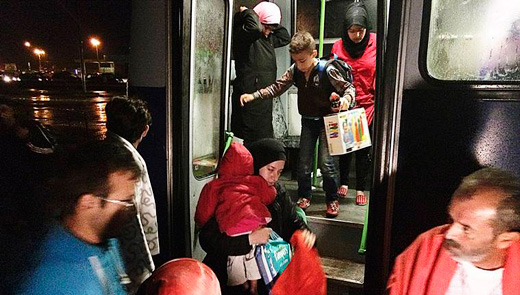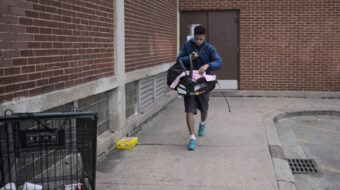
“Shoot them down!” That’s one answer to the problem of refugees and immigrants flooding into Germany, clearer even than any Trump-wall. It was offered by Frauke Petry, head of Alternative for Germany (AfD), the fast-growing party which, now at 12 percent nationally, has moved up into third place, outstripping the Greens at 9-11 percent and the Left party (LINKE) at 8-10 percent.
No slips of tongue, finger, or mouse
Backing up Petry was her deputy Beatrix von Storch, who wrote in Internet: “That’s the law. People coming out of Austria have no right of asylum. And those on duty at the border may use their firearms … against people who resist repeated orders to halt by trying to flee.” When a journalist asked if this applied to women and children she answered approvingly “Ja.” Her response shocked so many that Frau von Storch backtracked, claiming that her finger had slipped on the mouse; she hadn’t really meant it after all. But Storch and Petry had indeed quoted a West German law of 1961. Sarcasm went viral about the troubles of a Storch (German for stork) with a mouse, but also about the years of reproach against GDR border guards for invoking a very similar law.
Their words, though lamely retracted, were no slips of tongue, finger, or mouse but well calculated to appeal to widespread, growing fears and hatred toward “invading foreigners,” especially “Islamists.” For a while most of the media supported Angela Merkel’s surprising statement last summer that all refugees were welcome. But the worst of the gutter press and, a bit more cautiously, many on TV, now dwell increasingly on unpleasant difficulties in integrating and housing over a million arrivals and stridently reporting any crimes or misdemeanors committed by men with foreign-sounding names.
Episodes like the groping and mugging on New Year’s Eve, though probably not by recent immigrants, provided a field day for those with racist sentiments – and the AfD kept growing, ever bigger, ever more dangerous. Its Pegida soulmates in Dresden (if such people have any kind of souls) still march every Monday, though recently with diminishing numbers. Their attempts to go European, with rallies in Warsaw, Amsterdam, Prague, and Milan, almost unanimously fizzled, with only a few dozen, at most a few hundred adherents scowling angrily at their adversaries. This was good news. But over ten percent would vote for Pegida if it fields candidates. If it doesn’t, most would vote for the very similar AfD.
Bowing to the pressure
There is a marked indirect result; in Bavaria, which sits on all entry portals from the South, its strong, separate sister party of Merkel’s CDU always pushes from the further right. Worried about losing ground to the AfD, it is making constant demands that immigration rules be toughened. Merkel’s party, beset by its tough Bavarian siblings and facing three important state elections in March, is anxiously watching its popularity slip downward and at signs of mutiny against Merkel’s hitherto unchallenged rule. It has been bowing to the pressure and dragging its limp Social Democratic partners with it. There were many quarrels: How many refugees should be sent back to Algeria, Afghanistan, Sudan, or Syria? How quickly? Many are unmarried men, many others are young husbands hoping to fetch wives and children they left behind. How many may do so? How many years should they wait? How many of the several thousand unaccompanied children must wait two years before their parents can join them?
The LINKE, though also uncertain about such complex matters, stresses that the wars and poverty causing the immigration must be confronted. It opposes sending German AWAC planes over Syria, it demands an end to weapon sales to all governments involved, it opposes a one-sided policy blaming only Assad and Putin while shutting eyes and supporting, with kindest words and deadliest weapons, Saudi Arabia, Qatar, and Turkey, which stoke the misery and keep bombing Kurds and Yemenis.
Progressives, though (quite uniquely) approving Merkel’s earlier humanitarian words, were skeptical about her deeds when she said, “If Europe fails on the question of refugees, it won’t be the Europe we wished for,” they wondered what kind of Europe that might be. Thinking of her strangulation of Greece and general “austerity” policy for poorer counties, poorer mostly thanks to German wealth, they were hardly euphoric.
Pressure from the AfD and its allies push the whole political establishment rightward, rather like Trump, less crudely but also reflecting general dissatisfaction with “status quo parties.” Could we see anything here like the “Bernie revolution” and its euphoria?
In Germany we already have a leftist party, the LINKE. Some of its leaders and members fought hard and won points on many issues despite media treatment nastier than any against Sanders (as yet!). There are many other fighting organizations. None have achieved anything like Bernie’s charisma.
Calling for a new start
Did a new candidate appear on the horizon or, more precisely, on the stage of Berlin’s Volksbühne theater on Feb. 9? Yanis Varoufakis, the 54 year-old, noble-nosed, head-shaven, motorcycling ex-Finance Minister of Greece, who left the Syriza government to protest its knuckling down to the commands of the financiers, called for a new start, not just in Greece but in all of Europe. Naming it the Democracy in Europe Movement (DiEM25), it aimed at a new constitution for the European Union by 2025 (hence the name). He shared the stage with many leftists, from LINKE co-chair Katja Kipping and Podemos politician Miguel Crespo Urban, and with some per video screen, like Barcelona mayor Ada Colau, U.S. economist James Galbraith, Wikileaks founder Julian Assange and Slovenian intellectual Slavoj Zizek. But not all were fully convinced.
Unlike some on the left, he wants neither to wreck nor leave the European Union, but wishes instead to save it, and with it all of Europe, from itself. Alarmed by a nearly total lack of solidarity for Greece last year, by the austerity crisis, the almost overwhelming immigrant onset and the growing danger of far-right forces like AfD, Golden Dawn, Le Pen and men like Geert Wilders, he wants no exit from the euro and no calls for social uprisings or split-offs of the EU but rather its united defense, regardless of party, even a disregard of parties.
He said: “I am proudly Left but DiEM25 is more than that. Neoliberalism has made social democracy impossible. I ask all democrats, social democrats, liberal democrats: can you live with this? We are radical in a way that liberal democrats must be if they are to survive.” His main call is for transparency and video coverage of European Union activities, with large-scale democratization the only way to prevent collapse and rightist chaos.
Other groups, like Attac, Blockupy, and the LINKE are making plans of their own for a hopefully growing number of ever larger demonstrations, urging European-wide solidarity and big change while opposing gathering shadows from the right. They will also watch the new DiEM25 with interest.
Since it and many protests will locate in Berlin, where elections are due in September, a brief look at its political scene is warranted. It is already warming up (like the weather this winter) but while Social Democrats, Christian Democrats, Greens, and the LINKE are watching polls rise and fall (in just that popularity order at the moment, a nasty new addition is expected; again the AfD, truly bloodthirsty buccaneers, while other quite peaceful pirates will soon be missing.
In 2006 the audacious young Pirates party, with its logo flag boldly billowing, cast anchor in Berlin. Its defense of internet freedom and transparent democracy was so attractive that it soon won almost 9 percent of the vote and 15 seats in the legislature and spread to other parts of Germany. It seemed to lean in a portside direction.
But as with pirate crews of yore (and modern portside-leaners, too, alas), it was soon rent by quarrels; a few sailed upwards and more to starboard, others quit political sea-faring altogether. Some, in their often daring apparel and hairdos, stayed bravely on. Most conspicuously, the head Pirate in Berlin’s legislature dug deeply and bravely into the dunghill of incompetence and buried-treasure corruption which have turned the new hub airport, planned to open in 2012 but due now, just maybe, in 2017, into a national joke. But he too, noting that the party has long stagnated at three percent and can hardly remain in office after September, decided to abandon ship with 34 fellow Pirates and, most interestingly, to support the LINKE (Left).
What this may mean is uncertain. Some in the Berlin LINKE hope for renewed strength from young people and want to join with the Greens in replacing the Christian Democrats (CDU) in a new coalition with the Social Democrats (SPD). Is that a Varoufakis direction? Others recall with worried melancholy that every time the LINKE has joined a coalition in Germany it ended up weaker than before. Yes, there are some good people here, too, but a Bernie Sanders or two would be a big help!
Photo: Syrian migrants leave a bus near the Austrian border in Hegyeshalom, Hungary, after Austria said it and Germany would let them in. | AP












Comments